Prior to the start of the season, I suggested that Valencia were as well placed as any side in years to finally break the seven-season dominance of La Liga’s top-three positions by Atlético Madrid, Barcelona and Real Madrid. Valencia came into the campaign on the back of consecutive top-four finishes and having become the first team outside the aforementioned trio to lift domestic silverware since 2010 when they defeated Barcelona in the Copa del Rey final. They had a quality coach, a healthy age profile and good underlying numbers. But their hopes of ending that hegemony were heavily contingent on an uneasy truce holding between head coach Marcelino and the club’s owner Peter Lim. After a series of disputes over transfer targets and the minutes allotted to young players, interspersed with public barbs back and forth, it took just three matches for things to break down. Marcelino was sacked in mid-September and replaced with Albert Celades -- Valencia’s 12th coach since Unai Emery’s departure in 2012. Valencia weren’t all that impressive over those first few matches, but subsequent performances have been even worse. While they find themselves just three points (and five positions) behind third-placed Atlético ahead of their trip to the Wanda Metropolitano on Saturday, they come into the fixture looking more like marginal top-four contenders than genuine top-three aspirants. 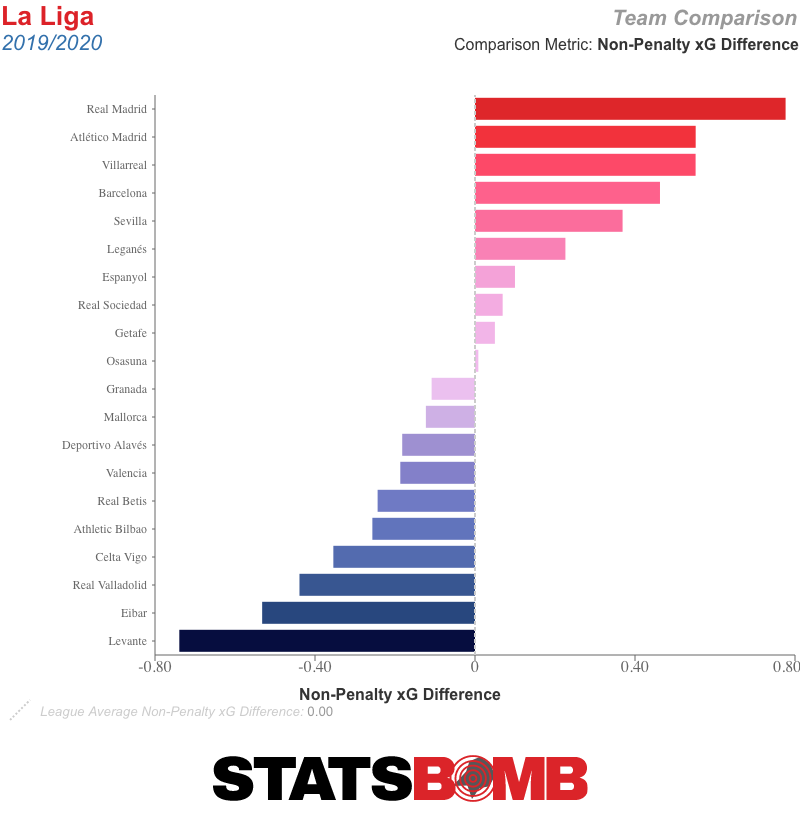 Celades wasn’t dealt the easiest of hands replacing a coach that many of the players were disappointed to see depart, and it will take some time for him to implement some of his own ideas in what is his first senior head coach role. He has only been in charge for five league matches, one of which was a 5-2 defeat away to Barcelona, so it’s not a fair sample, but his short tenure to date has nevertheless been the second worst five-match stretch Valencia have had in terms of expected goal (xG) difference since the start of the 2017-18 season. The worst comprised of his first three matches tacked onto Marcelino’s last two. They have been the worse side in xG terms in four of his first five fixtures -- against Barcelona, Leganés, Getafe and Alavés. Valencia sold none of their key players over the summer and arguably have a slightly stronger squad than they did last season, especially with Maxi Gómez getting off to a good start in front of goal following his move from Celta Vigo. But across the eight matches of the campaign to date, they’ve been worse at both a top-line and underlying level.
Celades wasn’t dealt the easiest of hands replacing a coach that many of the players were disappointed to see depart, and it will take some time for him to implement some of his own ideas in what is his first senior head coach role. He has only been in charge for five league matches, one of which was a 5-2 defeat away to Barcelona, so it’s not a fair sample, but his short tenure to date has nevertheless been the second worst five-match stretch Valencia have had in terms of expected goal (xG) difference since the start of the 2017-18 season. The worst comprised of his first three matches tacked onto Marcelino’s last two. They have been the worse side in xG terms in four of his first five fixtures -- against Barcelona, Leganés, Getafe and Alavés. Valencia sold none of their key players over the summer and arguably have a slightly stronger squad than they did last season, especially with Maxi Gómez getting off to a good start in front of goal following his move from Celta Vigo. But across the eight matches of the campaign to date, they’ve been worse at both a top-line and underlying level. 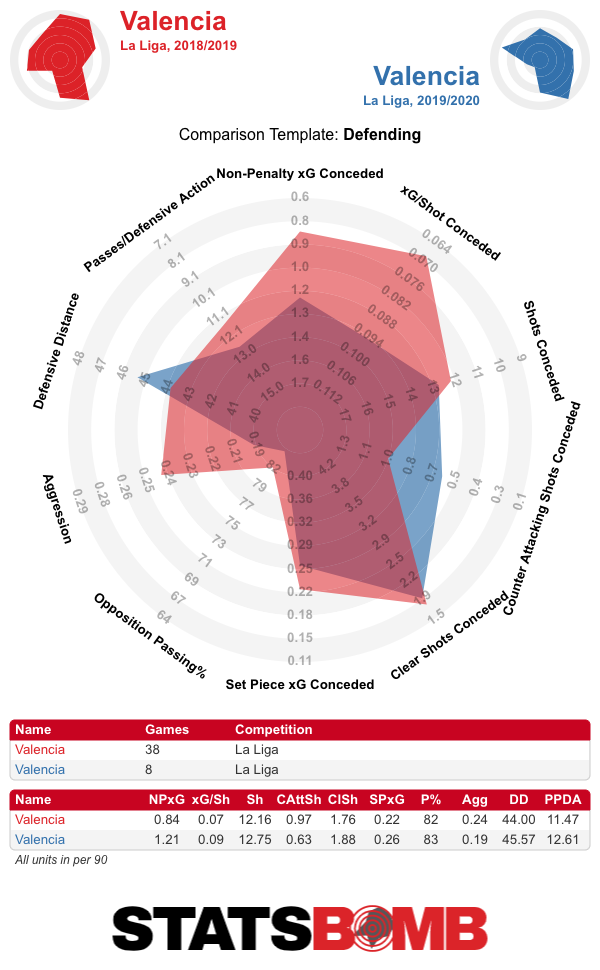
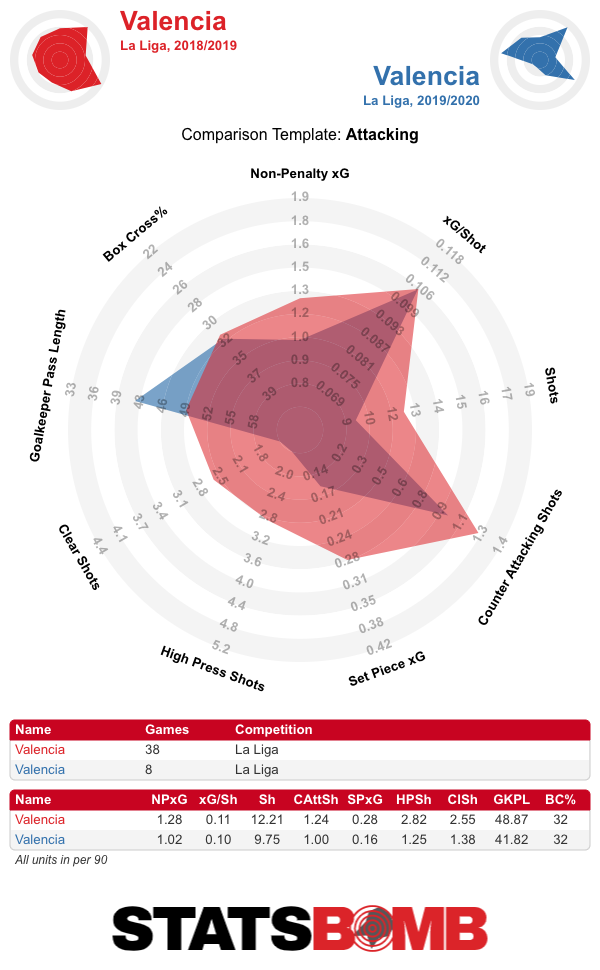 The fact that at least in its early stages, there seems to be little to separate a fairly large chunk of the league this season plays to Valencia’s favour, if they can swiftly find a way to improve performances and results. Consecutive wins away to Athletic Club and at home to Alavés have provided a bit of cautious optimism, but the trip to Atlético could easily temper that. Valencia last defeated them in 2014 and haven’t won away there since 2011. “Against Atlético, we will really see where we stand,” fullback José Gayá said this week. Atlético are certainly as good a barometer as any. Of all the teams who have taken part in La Liga in all of the last five seasons, only Barcelona have had a lower percentage variance between their best and worst points tallies than Diego Simeone’s side. They have been a picture of consistency, regularly converting the league’s third-biggest budget into top-three finishes. Players have come and gone, but Simeone and his staff have maintained a steady level of performance. Until very recently (damn you Espanyol!), Saturday’s match would have pitted La Liga’s longest and shortest-serving coaches against one another. This summer saw huge turnover at Atlético. Four regular starters and other mainstays of the Simeone era departed, and a series of new signings arrived in their place. João Félix and full-backs Kieran Trippier and Renan Lodi have immediately become regulars. As is becoming tradition, pre-season was filled with talk of a switch to a more expansive approach. The reality is that Atlético are the same team as always: very strong defensively and by the underlying numbers at least, above average in attack.
The fact that at least in its early stages, there seems to be little to separate a fairly large chunk of the league this season plays to Valencia’s favour, if they can swiftly find a way to improve performances and results. Consecutive wins away to Athletic Club and at home to Alavés have provided a bit of cautious optimism, but the trip to Atlético could easily temper that. Valencia last defeated them in 2014 and haven’t won away there since 2011. “Against Atlético, we will really see where we stand,” fullback José Gayá said this week. Atlético are certainly as good a barometer as any. Of all the teams who have taken part in La Liga in all of the last five seasons, only Barcelona have had a lower percentage variance between their best and worst points tallies than Diego Simeone’s side. They have been a picture of consistency, regularly converting the league’s third-biggest budget into top-three finishes. Players have come and gone, but Simeone and his staff have maintained a steady level of performance. Until very recently (damn you Espanyol!), Saturday’s match would have pitted La Liga’s longest and shortest-serving coaches against one another. This summer saw huge turnover at Atlético. Four regular starters and other mainstays of the Simeone era departed, and a series of new signings arrived in their place. João Félix and full-backs Kieran Trippier and Renan Lodi have immediately become regulars. As is becoming tradition, pre-season was filled with talk of a switch to a more expansive approach. The reality is that Atlético are the same team as always: very strong defensively and by the underlying numbers at least, above average in attack. 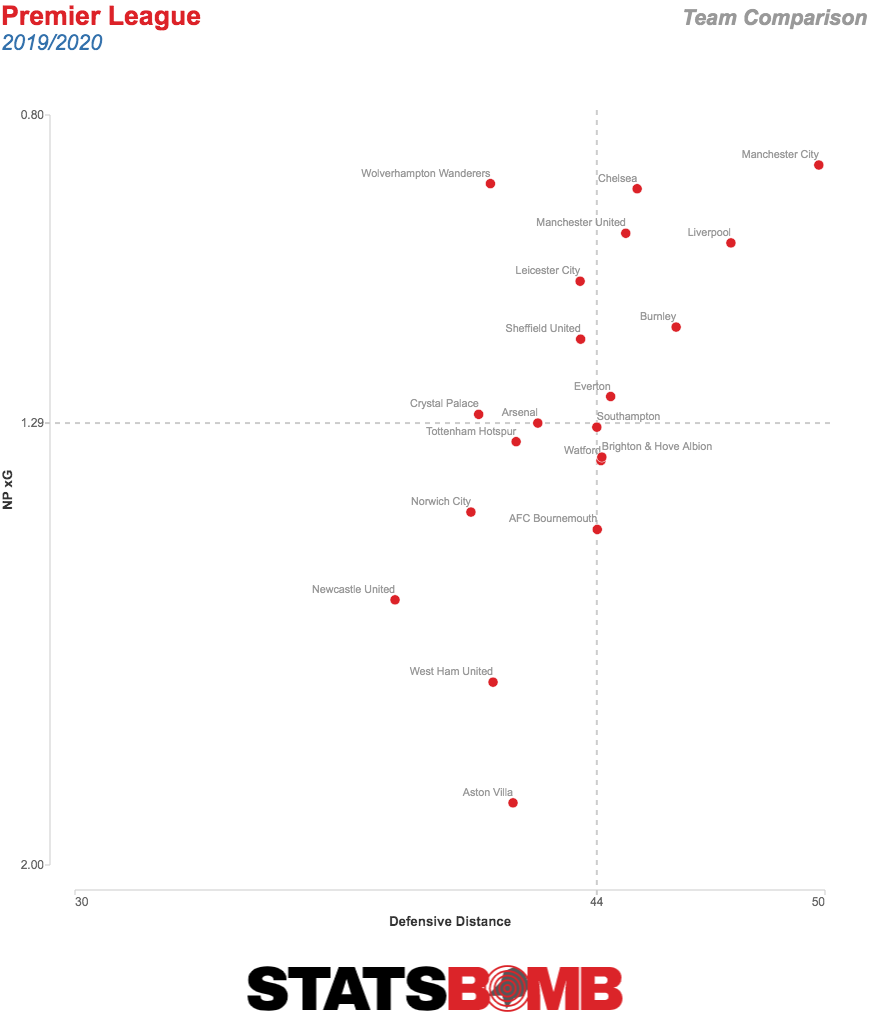 Simeone has really leaned hard on his defence so far. Atlético have kept clean sheets in seven of their 10 matches in league and Champions League play, including in each of the last five. Three of their last four league matches have ended 0-0. Their 0.52 xG conceded per match is comfortably the lowest mark in La Liga. Only three teams are conceding less shots, and no one is giving up such low-quality ones.
Simeone has really leaned hard on his defence so far. Atlético have kept clean sheets in seven of their 10 matches in league and Champions League play, including in each of the last five. Three of their last four league matches have ended 0-0. Their 0.52 xG conceded per match is comfortably the lowest mark in La Liga. Only three teams are conceding less shots, and no one is giving up such low-quality ones. 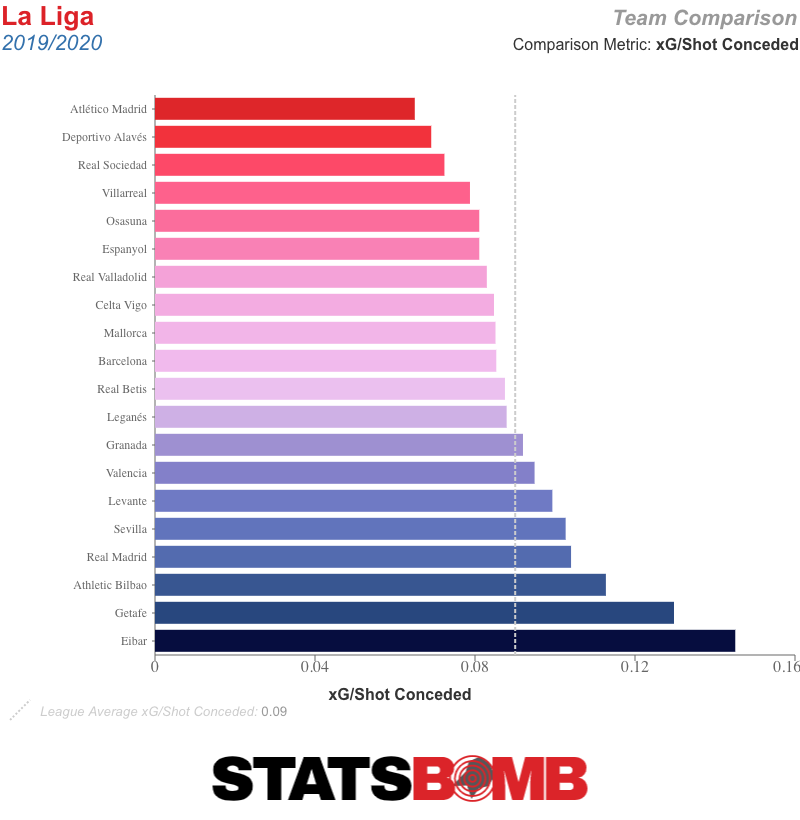 That is providing a stable base for Simeone’s experiments (including a midfield diamond with Thomas Lemar at its tip) as he reaches for a coherent attack. Antoine Griezmann was such an important cog in their previous set up that it was always going to take some time to work out an alternative. Atlético’s unsuccessful late-window attempts at signing Rodrigo from Valencia -- a relatively close stylistic match -- illustrated his lack of confidence that existing options would prove sufficient. So far, his side are doing enough to get by with a mix of average open play numbers and better than average set-piece output. Atlético’s supporters are likely to suffer through a fair number of low-scoring slogs this season (no other team’s matches have seen less goals so far; only those of two have seen less xG), but that might just be what is required to keep them in the realm of their usual points tally and so continue their run of top-three finishes through an eighth consecutive season. It is a bet on no one emerging from the pack below. Valencia were the most likely candidates before internecine squabbles intervened. Unless Sevilla, Real Sociedad or Villarreal show themselves to be genuine contenders over the next couple of months, it will probably prove quite a safe one.
That is providing a stable base for Simeone’s experiments (including a midfield diamond with Thomas Lemar at its tip) as he reaches for a coherent attack. Antoine Griezmann was such an important cog in their previous set up that it was always going to take some time to work out an alternative. Atlético’s unsuccessful late-window attempts at signing Rodrigo from Valencia -- a relatively close stylistic match -- illustrated his lack of confidence that existing options would prove sufficient. So far, his side are doing enough to get by with a mix of average open play numbers and better than average set-piece output. Atlético’s supporters are likely to suffer through a fair number of low-scoring slogs this season (no other team’s matches have seen less goals so far; only those of two have seen less xG), but that might just be what is required to keep them in the realm of their usual points tally and so continue their run of top-three finishes through an eighth consecutive season. It is a bet on no one emerging from the pack below. Valencia were the most likely candidates before internecine squabbles intervened. Unless Sevilla, Real Sociedad or Villarreal show themselves to be genuine contenders over the next couple of months, it will probably prove quite a safe one.
Stats of Interest
Speaking of Atlético’s attack, Diego Costa’s radar is pretty grim (albeit marginally improved in shot output from last season). 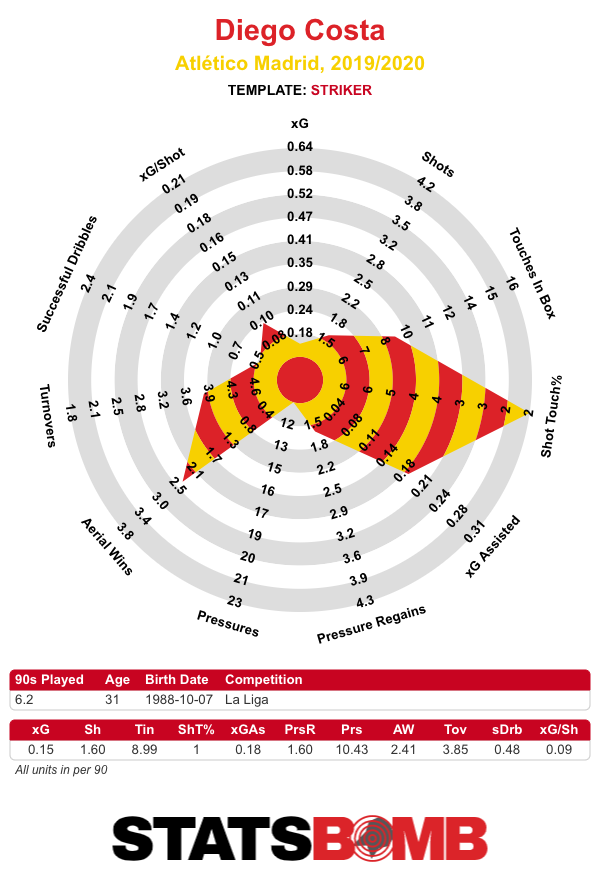 Care to venture a guess at La Liga’s most two-footed player so far this season? No, not him. Or him. Or him. Nope. It’s Tomás Pina of Alavés, with a near perfect 50/50 split between his left and right foot.
Care to venture a guess at La Liga’s most two-footed player so far this season? No, not him. Or him. Or him. Nope. It’s Tomás Pina of Alavés, with a near perfect 50/50 split between his left and right foot.